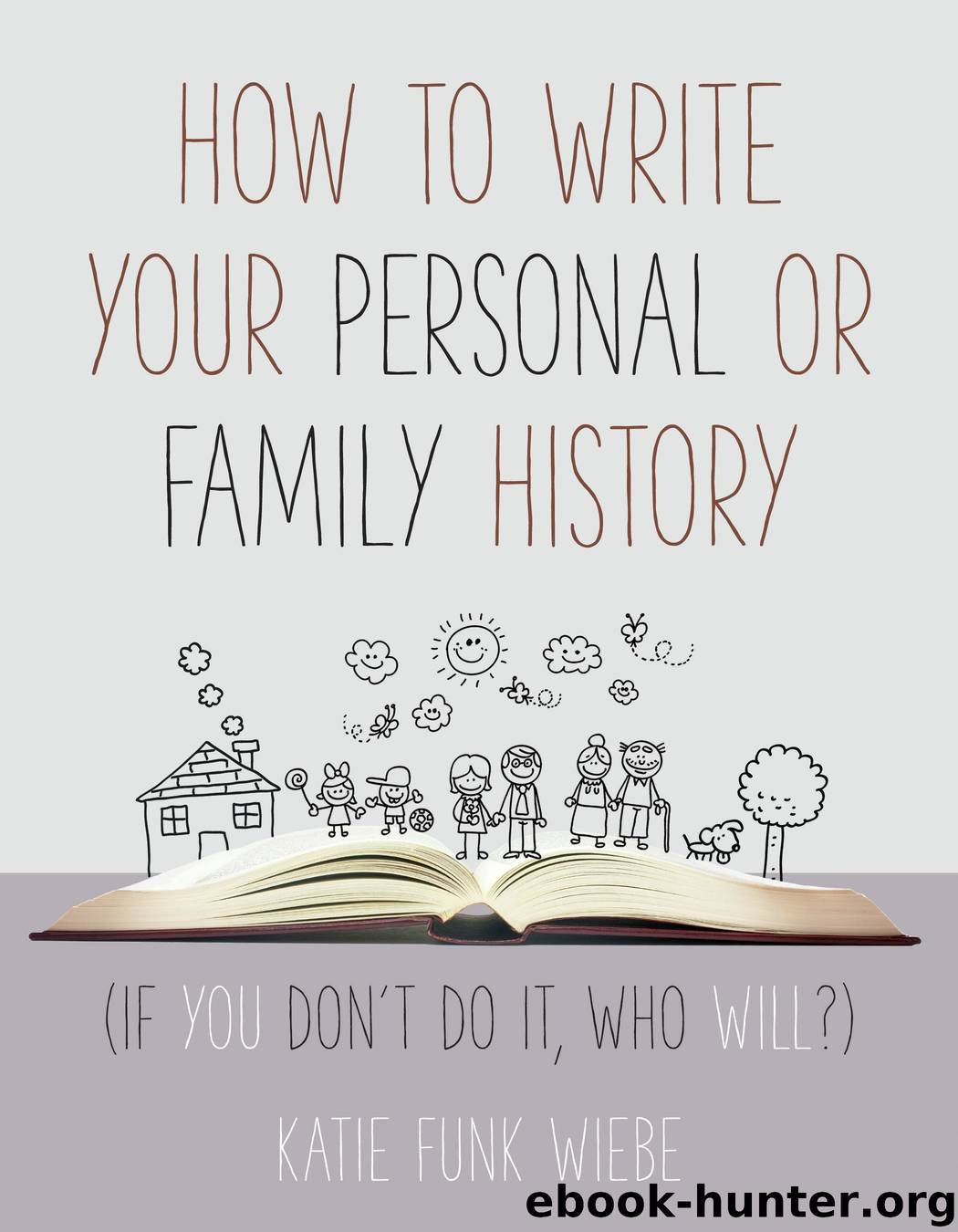How to Write Your Personal or Family History by Katie Wiebe

Author:Katie Wiebe
Language: eng
Format: epub
Publisher: Good Books
Published: 2016-11-16T05:00:00+00:00
STAGE 4: A LOOK AT THE MIDDLE YEARS (NOT MIDDLE AGE)
As we have seen, young adulthood is often the time life makes a turn from one kind of life to another—forward or backward. These moments may not always be productive or pleasant, but we have to deal with them. In working with the middle years, you want to identify the markings that continue to happen. My husband’s death, for example, was a major unexpected turning point at age 38. It meant I had to return to work to support my family. Eventually, it led to my returning to school to be able to teach, which then led to a long chain of other events.
When are you an honest-to-goodness middle adult? Once again, chronological age is not always the determining factor. The middle years differ for each person. In our society with a long life expectancy, they may be from about age 40 to 60 and beyond. Some researchers have the middle years start at age 50, maybe even 60. In societies with a low life expectancy (up to late 40s), the middle years could be the early 30s. You decide what your middle years are.
In Christian Life Patterns: The Psychological Challenges and Religious Invitations of Adult Life, Evelyn Eaton Whitehead and James D. Whitehead write that, psychologically, the mid-years are marked by the dominance of three interwoven themes: personal power, care, and interiority.
Personal Power
The middle-aged person wants and needs to be effective in the tasks that define his or her work. It’s a time when you come into your own as a human being. You know who you are and what you are capable of. You have a better sense of mastery of your life. This is the time your dream as a young adult becomes a reality.
Care
To mature, you need the experience of others being dependent on you, of being taken care of by you. When you are an adult, you are willing and ready for the care of others. Caring is rooted in awareness of personal power. In the middle years, you have more discretionary money, so you can now give it away or spend it in broader social concerns. You have proven skills, so you can use them in some venture that will count. You have time and energy.
You can contribute to church and community programs and causes. You have a strong sense of self-identity. You can stand up and lead neglected or set-aside causes. You have readiness to mentor young people.
Interiority
As the mid-life person continues to move outward, he or she develops a heightened sensitivity to self and an increasing focus on inner needs, accompanied by interior stock-taking and exploring the world within.
Middle adulthood is not usually a plateau but a movement toward growth and change. Toward the end of this period, most people become aware of their mortality and that they may have fewer years ahead than they have already lived. Retirement lies ahead, which may mean new social roles, financial changes, and changes in living patterns and workloads.
Download
This site does not store any files on its server. We only index and link to content provided by other sites. Please contact the content providers to delete copyright contents if any and email us, we'll remove relevant links or contents immediately.
Asking the Right Questions: A Guide to Critical Thinking by M. Neil Browne & Stuart M. Keeley(5771)
Autoboyography by Christina Lauren(5234)
Eat That Frog! by Brian Tracy(4535)
Dialogue by Robert McKee(4400)
Sticky Fingers by Joe Hagan(4197)
Journeys Out of the Body by Robert Monroe(3624)
Annapurna by Maurice Herzog(3467)
Full Circle by Michael Palin(3448)
Schaum's Quick Guide to Writing Great Short Stories by Margaret Lucke(3378)
Elements of Style 2017 by Richard De A'Morelli(3349)
The Art of Dramatic Writing: Its Basis in the Creative Interpretation of Human Motives by Egri Lajos(3067)
Atlas Obscura by Joshua Foer(2961)
Why I Write by George Orwell(2951)
The Fight by Norman Mailer(2939)
The Diviners by Libba Bray(2936)
In Patagonia by Bruce Chatwin(2927)
The Mental Game of Writing: How to Overcome Obstacles, Stay Creative and Productive, and Free Your Mind for Success by James Scott Bell(2908)
Venice by Jan Morris(2573)
The Elements of Style by William Strunk and E. B. White(2473)
